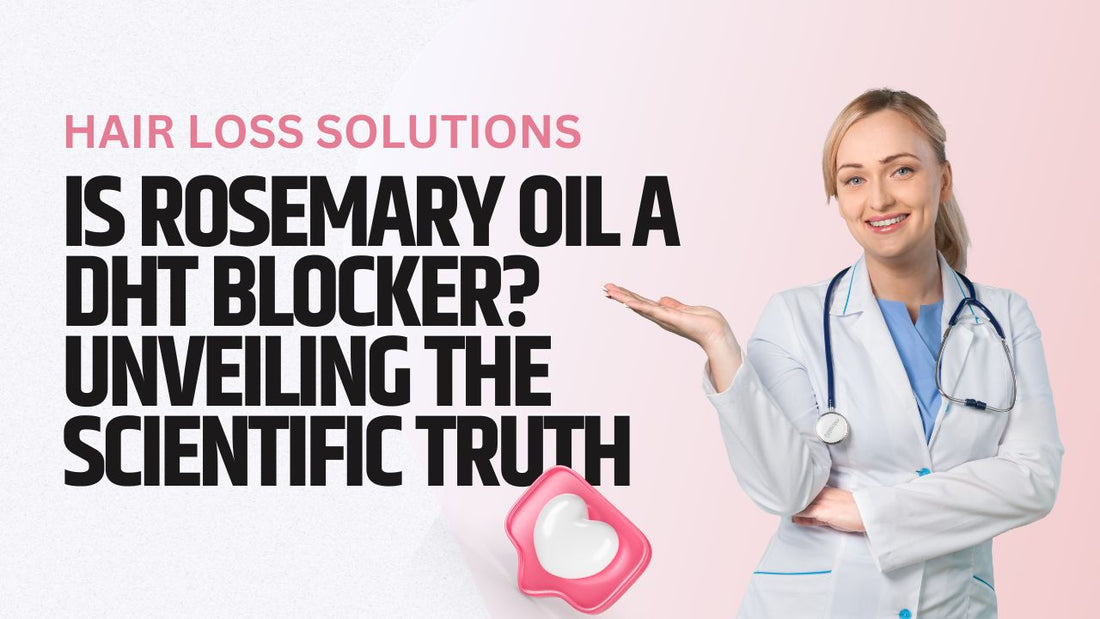
Is Rosemary Oil a DHT Blocker? Unveiling the Scientific Truth
Share
You may have heard the term Dihydrotestosterone, or DHT, making rounds in health circles, especially if hair loss has been a concern for you. With the increasing trend of people shifting towards natural alternatives for healthcare, essential oils have become a topic of considerable interest. Rosemary oil, in particular, is being scrutinized for its possible effects on DHT levels and, consequently, hair loss. In this article, we'll probe into this exciting subject to shed light on the question: Can rosemary oil act as a DHT blocker?

What is DHT and Why Is It Important?
DHT, or Dihydrotestosterone, is an androgen hormone. It plays a pivotal role in developing male biological characteristics, such as facial hair and muscle mass. However, its presence is not confined to males; DHT is also found in females, albeit in smaller quantities. Elevated levels of DHT are commonly linked to androgenetic alopecia, a leading cause of hair loss in both men and women. This connection between high DHT levels and hair loss has fueled interest in substances that can block or inhibit DHT.

The Role of DHT Blockers
DHT blockers serve as inhibitory agents, mitigating the enzyme 5-alpha reductase's ability to convert testosterone into DHT. This enzymatic reaction is a key factor in elevating DHT levels. While synthetic DHT blockers like Finasteride are often effective, they also come with a range of side effects, such as skin irritations and sexual dysfunction. These drawbacks have encouraged people to look for natural, less intrusive options to tackle elevated DHT levels, hence the increased interest in rosemary oil and other natural substances.

Understanding Rosemary Oil
Rosemary oil has been a staple in traditional medicine, especially in Mediterranean cultures. Its rich, aromatic profile makes it a common ingredient in cooking, perfumes, and therapeutic applications. But rosemary oil is more than just a fragrant addition to your spice rack or skincare routine.

Chemical Constituents of Rosemary Oil
The effectiveness of rosemary oil can be traced back to its complex chemical makeup, which includes a variety of antioxidants and anti-inflammatory compounds. Of particular interest are ursolic acid and rosmarinic acid, chemical components with proposed DHT-blocking activity. Understanding these compounds is vital when evaluating the scientific literature related to rosemary oil as a potential DHT blocker.

Is Rosemary Oil a Proven DHT Blocker?
This is the core question, isn't it? The evidence leans toward a positive answer. Several research studies indicate that rosemary oil might, indeed, have DHT-blocking properties. One study from 2015 showed that rosemary oil performed as effectively as minoxidil, a well-known pharmaceutical hair growth treatment. The added advantage was that subjects reported less scalp irritation compared to minoxidil, suggesting a better side-effect profile.

Comparative Analysis: Rosemary Oil vs. Conventional DHT Blockers
When we juxtapose rosemary oil with conventional DHT blockers, several aspects merit attention. Firstly, rosemary oil is a natural alternative, which makes it appealing to those cautious about synthetic substances. Secondly, it is generally more cost-effective than pharmaceutical treatments. However, the downside is that more extensive and long-term studies are required to establish its efficacy conclusively. While initial results are promising, the scientific community still needs to reach a consensus.

How to Use Rosemary Oil for Hair Care
Incorporating rosemary oil into your hair care routine is relatively straightforward. You can apply it directly onto your scalp, mix it with a carrier oil for better spread, or add a few drops to your regular shampoo. Regardless of the application method, always remember to perform a patch test to rule out any potential allergic reactions.

Additional Natural DHT Blockers
Apart from rosemary oil, other natural substances like pumpkin seed oil and saw palmetto have shown promise in blocking DHT. Combining these natural blockers can potentially offer a multi-faceted, holistic approach to managing hair loss, making your regimen more effective and comprehensive.
Who Should Consider Using Rosemary Oil?
If you are in the camp looking for natural alternatives to tackle hair loss related to elevated DHT levels, rosemary oil might be a suitable option. However, it's essential to consult healthcare professionals for a diagnosis and personalized advice. Special populations, such as pregnant or nursing women and those with other medical conditions, should exercise additional caution.
Limitations and Areas for Further Research
While the existing body of research and anecdotal reports are compelling, they are not exhaustive. More rigorous, large-scale studies are essential to validate rosemary oil's effectiveness as a DHT blocker. We advocate for deeper and more diverse research to fill these gaps and provide conclusive evidence.

Final Thoughts and Practical Recommendations
In wrapping up, we've explored the existing scientific literature and expert opinions on rosemary oil's role as a potential DHT blocker. While the data is encouraging, due diligence is necessary. Always consult healthcare professionals for a personalized, well-informed approach to utilizing rosemary oil or any other natural DHT blockers.

Frequently Asked Questions (FAQ)
Can I use rosemary oil along with my regular hair loss medication?
While some people have successfully combined rosemary oil with other treatments, it's crucial to consult your healthcare provider for personalized advice.
Are there any side effects to using rosemary oil?
Generally, rosemary oil is well-tolerated, but skin irritation or allergic reactions are possible. A patch test is always recommended.
How long should I use rosemary oil before seeing results?
Hair growth and restoration is a slow process; thus, you may need several months of consistent application before noticing significant improvements.
Is rosemary oil suitable for all hair types?
Rosemary oil is generally versatile and suitable for most hair types, but if you have specific concerns or conditions, consulting a healthcare professional is advisable.













